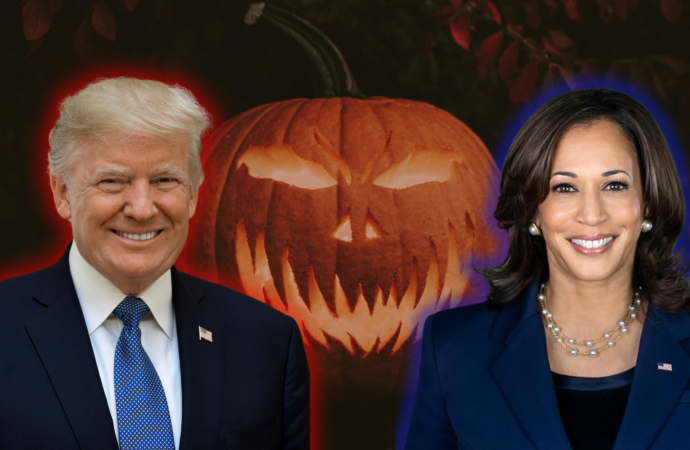Presidential frontrunner Donald Trump appears to have survived not one but three October Surprises during the last week.
For those unfamiliar with the term, an October Surprise is a last-minute, generally unexpected turn of events that occurs in the final weeks of a U.S. presidential election which can have a major impact on the outcome.
These surprises can be scandals, political bombshells, or other major news stories designed to shift public opinion and affect voter turnout. The timing of them is critical since they leave little opportunity for the campaign in question to respond before voters head to the polls.
Last Tuesday, The Atlantic’s Editor-in-Chief Jeffrey Goldberg published an article containing two shocking allegations against the 45th president.
The first was that Trump called fallen servicewoman Vanessa Guillén a “f*****g” Mexican” and refused to pay her funeral costs after personally offering the gesture to her family. The second was that, on a separate occasion, Trump told several staffers, “I need the kind of generals that Hitler had.”
While Goldberg kept his sources suspiciously anonymous, former White House Chief of Staff John Kelly was happy to add credence to the allegations.
The media machine got to work, and within hours major publications had rehashed the rumors. Google swiftly gave the stories pride of place on its Top Stories carousel. Vice President Kamala Harris even held a three-minute emergency press conference to warn Americans that Trump “wants unchecked power.”
But they were October Surprises that weren’t meant to be.
The alleged conversations, which supposedly took place during Trump’s previous term and conveniently surfaced just days before voters cast their ballots, were variously debunked or denounced by a parade of people in the know—including Vanessa Guillén’s sister, the family’s attorney, a top Trump staffer who helped translate for the family, Trump’s then chief of staff, VP Mike Pence’s chief of staff, and the former defense secretary, who is hardly a friend of Trump’s.
It didn’t help that the story was published by The Atlantic, with a majority owner being a company of major donor and friend of Kamala Harris, and that it was written by Jeffrey Goldberg, whose attempted 2020 “suckers and losers” October Surprise against Trump was also ultimately debunked.
But there was a third October Surprise in store for the Republican candidate just days later. Last week, The Guardian published bombshell claims from former model Stacey Williams that Donald Trump had sexually assaulted her 31 years ago in the presence of the late financier and convicted sex trafficker Jeffrey Epstein.
However, Williams’ claims have also come under intense scrutiny, not just for their convenient timing, but also the fact that she was an activist for Barack Obama during the 2008 election cycle and first levelled the allegations on a Harris campaign call.
They say a week is a long time in politics. Will an October Surprise yet derail the Trump campaign—or the Harris campaign for that matter? Going on history, anything is possible.
The term “October Surprise” first entered the American lexicon in 1980. However, the phenomenon itself dates as far back as the 1840s, when New York Democrats waited until mid-October to accuse the Whig Party of paying Pennsylvania voters to cross state lines and vote illegally, in an election nevertheless won by the Whig candidate William Henry Harrison.
Consider some other notable October Surprises from history:
In 1968, President Lyndon Johnson announced a halt to bombing in Vietnam, a strategic move to aid Democratic candidate Hubert Humphrey.
In 1980, rumors surfaced that Ronald Reagan’s campaign thought that Jimmy Carter’s administration had secured the release of American hostages in Iran and that Carter’s campaign was delaying an official announcement as an “October Surprise.” Though the suspicions were false, the term still was coined.
In 1992, while George H.W. Bush was running for re-election, Special Prosecutor Lawrence Walsh indicted Reagan’s Defense Secretary Caspar Weinberger over the Iran-Contra scandal, creating challenges for Bush’s campaign.
In 2000, just days before the election, the revelation of George W. Bush’s 1976 DUI arrest created uncertainty in a tightly contested race against Al Gore.
In 2004, Osama bin Laden’s video message to the U.S. days before the election refocused voter attention on national security, benefiting George W. Bush’s campaign.
In 2016, FBI Director James Comey announced the reopening of the investigation into Hillary Clinton’s emails, a development that significantly impacted her campaign against Donald Trump in the election’s final days.
And in 2020, an abandoned laptop belonging to Hunter Biden surfaced, implicating his father Joe in a complex international money laundering scheme—though Big Tech, the legacy media, and the intelligence community successfully kept the story from the public eye, clearing the way for Joe Biden’s election.
Today, Trump might be the favorite for president, though he is certainly the underdog when it comes to the American institutions that hold the levers of power, and thus, he is the most vulnerable to an October Surprise.
But by the very nature of surprises, there is simply no way of predicting how a last-minute event could change the outcome of this year’s election for Trump or Harris.
Either way, these next two weeks will be fascinating, and I’ll be sure to have the popcorn ready.
—
Image credit: Unsplash (pumpkin); public domain (Trump); public domain (Harris)
2 comments















2 Comments
Su nombre *
October 30, 2024, 10:24 pmthis president is not considering a good things for other countries
REPLYContinentsEdge@Su nombre *
October 31, 2024, 4:13 pmIt is not the primary task of the US President to determine what is good for other countries. It is his/her task to determine within moral grounds what is good for the over 300 million
REPLYUS citizens. If every president of every country would make that clear cut determination, there would be a drastic reduction of lives lost on the battlefield (eg Ukraine) and in a myriad of other ways.